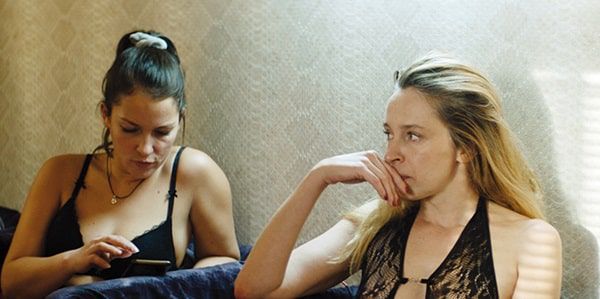 |
| Bliss |
German director Henrika Kull takes audiences inside a working Berlin brothel, in her sophomore feature Bliss. The drama centres on the romantic relationship that forms between Sascha (Katharina Behrens) and new girl Maria (Adam Hoya), but their insecurities and struggles to open up threatens their hopes of finding something more emotionally permanent.
In conversation with Eye For Film, Kull discussed taking her audience into unfamiliar spaces, challenging preconceptions and changing perception.
Paul Risker: Filmmakers are often asked what they want the audience to take away from a film. Speaking with directors, I get the sense they’re often not trying to tell the audience anything, but instead give them an experience. Is this how you approach filmmaking?
Henrika Kull: Yes, and the places I go in my research, for example with my first film Jibril, was to prison, but also the Arab community of Berlin, and here it was an actual brothel. I was fascinated and fell in love with all the people in this place, and the wrong expectations. I love my job when I get to experience these kinds of places, and this is something I want to share with the audience. I want to show them these places in a new way, as I experienced them, as authentic as possible, but still with fictional characters, by bringing them into environments they wouldn't usually see. Also, by finding the beauty in the places that aren't supposed to be beautiful.
PR: The spaces here are perceived as dirty, taboo and degrading. I don't believe it's a fair judgement of either these women in the brothel or the recriminations directed towards the pornography industry. We habitually push people to the fringes and condemn them without trying to understand the person or the work. Your film shows them to be regular people earning a living, and there’s an interesting conversation about the low pay of shop work. These women echo a disillusionment that’s a common reality, showing that they’re not that different, instead it’s an issue with how how they're viewed.
HK: It’s crazy that they're suffering mostly from the stigma of society, not from their job, and they’re forced to live this double life and not be honest. Still, I'd never say I love the fact that sex work exists, or that I love the patriarchal system in which sex work can exist, because it's still something that generally women do for men, not the other way around. In patriarchal thinking and in capitalism, it works like this and I don't like it.
I wanted to portray the strength of these women and how they’re more empowered than the women outside. They're aware of the structures and the system, and they somehow see it in an ironic way. It doesn't necessarily have to be feminist or intellectual, but being inside of those structures every day allows you to understand the irony of the structures of power, money and sex. I wanted to say that this is a normal job and if a woman decides she wants to do it rather than work in a shop, then she can, but I don't want to say I appreciate the existence of sex work.
PR: Your approach is to not excuse nor condemn, and instead of choosing a side, you show for better or worse, this space is a common reality.
 |
| Bliss |
HK: … It felt to me that the women inside the brothels were the ones that have the power to set the boundaries. It’s a service, or a deal, and outside of that it's harder to set the boundaries because they’re not clear, and there’s a lot of toxic masculinity and misogyny, even if men, or society say that we're very pro-female and feminist – it’s still not true.
There’s an interesting flip when you go to a brothel because something changes, and that's what was so fascinating. I went to many brothels and spent a lot of time in them over the years. I always felt a little matriarchal because they're laughing about men and how they function, and it somehow deconstructs them. … It’s why I always went back. I loved these special women who when we were shooting, would be sitting around and making fun of their jobs, their clients and the whole capitalist and patriarchal system.
PR: Are you optimistic about the progress we're making towards gender and racial equality?
HK: I’ve been in New York lately and they're ahead of Europe in many ways. I was impressed how their way of thinking is far ahead of us, by five years. Right now I'm in Israel and they're ten years behind Europe – they’ve a middle eastern approach. I see progress and people beginning to change how they think, so I feel something is happening.
I'm 37 now and when I was 17 it was different how you’d set your boundaries as a woman. There’s an awareness and progress now, and that's why I'm still optimistic. Also, to see that we can go even further, which I saw in New York. I was in a bubble there, but still, it's normal to ask what pronouns you use? So many of the things that are still weird in Berlin, in Germany and Europe as a whole, it's normal there.
PR: Do you hope in time Bliss will be a look back at how things used to be?
HK: … It’s always a look back, because society and morals are constantly changing. We can’t read Hannah Arendt without questioning her, because some of her statements are deemed racist in today’s context, similarly to Simone de Beauvoir. Even 50-year-old books by very smart people are outdated and that’s why I think religion is weird - where people still stick to the morals of a 1,500-year-old Book like the Koran for example, without questioning the misogynist rudiments of it.
Hopefully we'll see this film in 20 years time and think, 'What?'
PR: Before to after, has the process of making this film changed you as a person?
HK: Yes, and that's the reason why you take the team and everyone on the journey, to be someone else afterwards. Why I love it so much is because you understand something in a deep way and you feel differently afterwards, not just intellectually but emotionally. All the people that ran this brothel were a part of the team, and they felt differently afterwards. It was the same thing with my first film.
I received some nice messages on Instagram from audiences all over the world, about how they somehow see it differently now. It wasn't hundreds of messages, but one here, and one there, and it’s always about changing someone's perspective with the film. The women did it with their presence and it’s beautiful.
PR: Speaking with Mark Cousins for his new documentary, The Story of Film: A New Generation, he discussed how filmmakers don’t want to be defined by gender nor nationality. When we discuss women filmmakers, we often try to distinguish between the male and female gaze, but do women shoot scenes differently to men, for example sex scenes or emotional moments?
HK: I love the films of Lars von Trier, because his female characters are outstanding, but besides him, all the films I love are films by women filmmakers. For example, in Portrait of A Lady On Fire, the female gaze is very strong. In the sex scenes, the way the camera is used, it's a different way of telling a story. The films of von Trier are so different, and not just the sex scenes. It's a different gaze and I'm interested in that.
I think he's right, and at some point we will see it as a film from a person, but we're not there yet. There are female directors that copy the male gaze because that's the system they're brought up in. It’s still in our visual memory and I sometimes copy the male gaze, but then I question why, because it's not mine, and then I try to change it.
Bliss is in cinemas now.





















